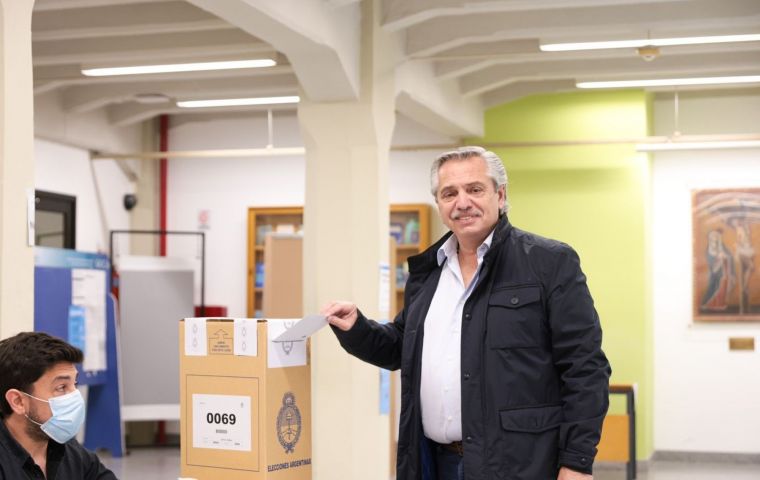Argentina’s ruling party loses Congress majority
 President Alberto Fernández still has two years left in office but with less Congressional support
President Alberto Fernández still has two years left in office but with less Congressional supportPreliminary but seemingly conclusive results from Argentina's mid-term elections Sunday showed the ruling party of President Alberto Fernández and Vice President Cristina Fernández de Kirchner would be losing its majority in Congress after 38 years.
Hardly hit by inflation and restrictive COVID-19 lockdowns while private parties went on at the Olivos Presidential residence, Argentine voters have withheld their support to the centre-left Frente de Todos (FdT) and trust once again the Juntos por el Cambio (JxC) coalition of former President Mauricio Macri (2015-2019) who had lost his reelection bid in just one round of voting merely two years ago. Hence, Sunday's results are believed to be a “punishment” vote against the federal government.
JxC held strong leads in key swing Senate races. The Upper House is key to appointing new judges or having other vital bills passed. In this scenario, President Fernandez faces two more years which will require strong political bargaining skills. He began Sunday evening by calling on JxC to show their “patriotic” cooperation in the times to come.
Fernández insisted he would solve the country’s debt with the International Monetary Fund (IMF), tackle the “evil” of inflation (over 50% annually) and send a long-term economic plan to Congress in early December, something investors and the IMF have urged for.
“In this new stage, we will deepen our efforts to reach a sustainable agreement with the IMF. We must clear the uncertainties that come with this sort of unsustainable debt,” Fernandez said.
Some 34 million Argentines were eligible to vote Sunday, with half the Lower House (127 seats) and 24 Senate seats from eight provinces at stake.
President Fernandez’s popularity has been dented by COVID-19 lockdowns in addition to spiralling inflation and the Argentine peso hitting record lows against the US dollar despite strict capital controls.
In the Province of Buenos Aires, the largest voting district nationwide, JxC took some 40.09% of the votes, followed by FdT's 38.39%. In the Province of Córdoba, JxC reached 54.05%; in Santa Fe 40.40% and in the Austonomous City of Buenos Aires 46.97%.
In that district, the FdT came in second with 25.12 of the votes despite challenges from ultra-rightwing liberal economist Javier Milei, who won third place with 17.06% of the votes, not bad for an outsider to politics with no prior electoral runs.
After September's defeat at the Mandatory, Open and Simultaneous Primary (PASO) elections, Fernández made some changes to his cabinet in a move aimed at rebuilding some political confidence from his constituency, a move which has proved insufficient.
“We must prioritize national agreements if we want to solve the challenges we face,” Fernández said in a speech Sunday in which he asserted that “a responsible opposition open to dialogue is a patriotic opposition.”
The president called for a “fruitful cooperation, for the general interest of the country.”
“With this election, a very tough scenario for our country that was marked by two crises comes to an end. One, the economic crisis, inherited from the previous government and from which there are still enormous challenges to be resolved. Another, the health crisis, caused by a cruel pandemic that, little by little, we are overcoming,” Fernández insisted.
”Today begins the second part of our government and I know well that Argentines need a horizon. We have the right to hope. We have the right to hope. I spoke and listened to hundreds of people. Everyone needs more certainties to know that every day, every month, we will be a little better knowing that after so much pain, also in homage to those who have left us, we will be able to reorganize our lives,” Fernández said.




Keine Kommentare:
Kommentar veröffentlichen